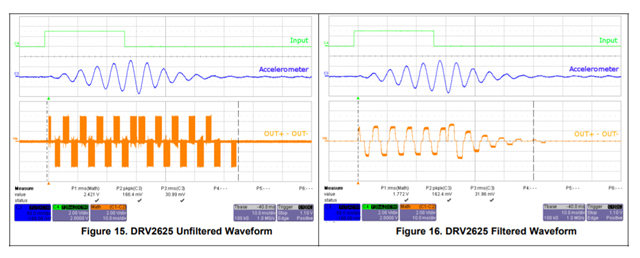Hello,
I am using DRV2605 to control a haptic device, especially for a linear resonant actuator (LRA).
Given the information from a document (https://www.ti.com/lit/ml/sszb151/sszb151.pdf?ts=1631214584550&ref_url=https%253A%252F%252Fwww.google.com%252F), it was expected that LRA performs better than ERM if a proper controller is used. However, even though I used an LRA and an ERM having similar specifications (e.g. force amplitude, G), ERM generated significantly higher force than LRA. This result was completely opposite to what was described in the document. I checked the output voltage pattern of DRV2605L, and its DC offset was not 0 V but around 1.6 V which means that the output was not AC. The voltage pattern was not clean square waves but a bit bizarre group of multiple square waves even though its frequency was close to the LRA's resonant frequency.
Below is questions I would like to ask regarding the driver and LRA:
1) I am wondering whether this driver is not designed to generate AC output or I made mistake while operating it. If so, it would be great if you direct me on how to use the driver properly.
2) If the driver is designed to generate not AC but PWM, are there any differences in performances of LRA when AC and PWM are supplied to it?
Thanks.


